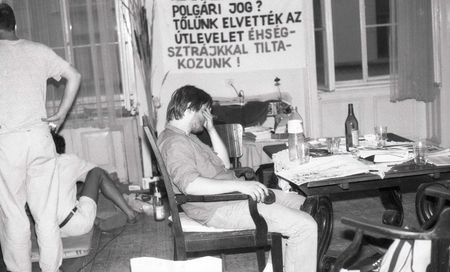We are happy to announce the next presentations of the Visegrad Scholarship at OSA. Join the event in the Archivum, or online! The presentations will be held at 11:00 CET on Thursday, July 6, 2023, in the Meeting Room of the Blinken OSA Archivum, and online.
The presentations will be held at 11:00 CET on Thursday, July 6, 2023, in the Meeting Room of the Blinken OSA Archivum, and online. The Zoom link of the meeting is:https://ceu-edu.zoom.us/j/92295884273?pwd=NTNDQTRZUGxzYkE2NGtLTi9vL1JaUT09
Lindsey N. Kingston, Associate Professor of International Human Rights, Webster University – Saint Louis, USA
Weaponizing Citizenship: From the Cold War to Russia’s Invasion of Ukraine
This presentation will explore the ways citizenship has been weaponized to the detriment of human rights, focusing on the Eastern Bloc during the Cold War. It considers how denationalization, statelessness, forced naturalization, passports, and identity documents were used to manipulate national narratives about belonging and identity, as well as to surveil citizens and punish suspected dissenters. These conversations remain salient during Russia’s invasion of Ukraine, when the Russian state is again leveraging citizenship as a weapon. This research agenda questions the common, uncritical narrative that citizenship always constitutes a social good.
Alexandra (Sasha) Zborovsky, PhD Candidate, University of Pennsylvania
Should I Stay, or Should I Go: Jewish Repatriation, Reunification and Emigration from the USSR between 1955 and 1995
During the second half of the 20th century, Offices of Visas and Registration across the USSR received almost 1.5 million applications from Soviet Jews with a seemingly audacious request: an exit visa. This presentation explores how Soviet Jews challenged the USSR’s ambivalent stance on population movement and—more specifically—emigration. Although contemporary discussions often prioritize conversations on immigration, historically, questions of emigration have generated equally if not more controversial tensions between the state and its citizens. The investigation begins in the mid-1950s, when 30,000 Soviet Jews immigrated to Israel through an initial repatriation to Poland, and continues through 1995, by which point over one million Soviet Jews found themselves scattered across the globe. While internal migration, displacement, and urbanization once proved vital for early Soviet state-building, by the 1950s, the USSR's policies on movement were fraught with contradiction. By the mid-to-late twentieth century, when the USSR sought to hinder Jewish emigration, Soviet Jews found ways to circumvent its efforts. By emphasizing the agency of everyday émigrés, this presentation explores how Soviet Jews used both extra-state networks, such as philanthropy or family, and the USSR’s fraught legal and theoretical conceptions of movement, to facilitate their emigration.

